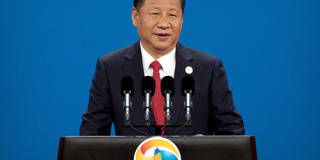Since introducing the "one belt, one road" initiative, China has been accused of trying to wrest greater control over the developing world, and even to replace the US as the dominant global superpower. The reality is not nearly so worrying.
LONDON – Later this month, Chinese President Xi Jinping will host a summit for many of the leaders of the 65 countries engaged in his “one belt, one road” (OBOR) initiative, a pioneering program that will channel billions of investment dollars toward infrastructure projects across Asia, Africa, and Europe. Despite a strong economic case for the project, reactions have been mixed.
The main impulse driving the OBOR initiative is physical connectivity: efficient infrastructure enhances productivity, fosters investment, and lowers the costs of trade. With effective channels for the exchange of goods and well-connected information networks, growth accelerates, economic opportunity increases, and inequality narrows.
The good news is that such infrastructure can be built in an efficient and cost-effective manner. The key is cooperative efforts that exploit each country’s respective comparative advantage, be it capital, technological know-how, logistical or construction capabilities, raw materials, or even industrial goods. Such an approach can jumpstart development in low-income countries, and help emerging economies bypass the dreaded middle-income trap.

LONDON – Later this month, Chinese President Xi Jinping will host a summit for many of the leaders of the 65 countries engaged in his “one belt, one road” (OBOR) initiative, a pioneering program that will channel billions of investment dollars toward infrastructure projects across Asia, Africa, and Europe. Despite a strong economic case for the project, reactions have been mixed.
The main impulse driving the OBOR initiative is physical connectivity: efficient infrastructure enhances productivity, fosters investment, and lowers the costs of trade. With effective channels for the exchange of goods and well-connected information networks, growth accelerates, economic opportunity increases, and inequality narrows.
The good news is that such infrastructure can be built in an efficient and cost-effective manner. The key is cooperative efforts that exploit each country’s respective comparative advantage, be it capital, technological know-how, logistical or construction capabilities, raw materials, or even industrial goods. Such an approach can jumpstart development in low-income countries, and help emerging economies bypass the dreaded middle-income trap.